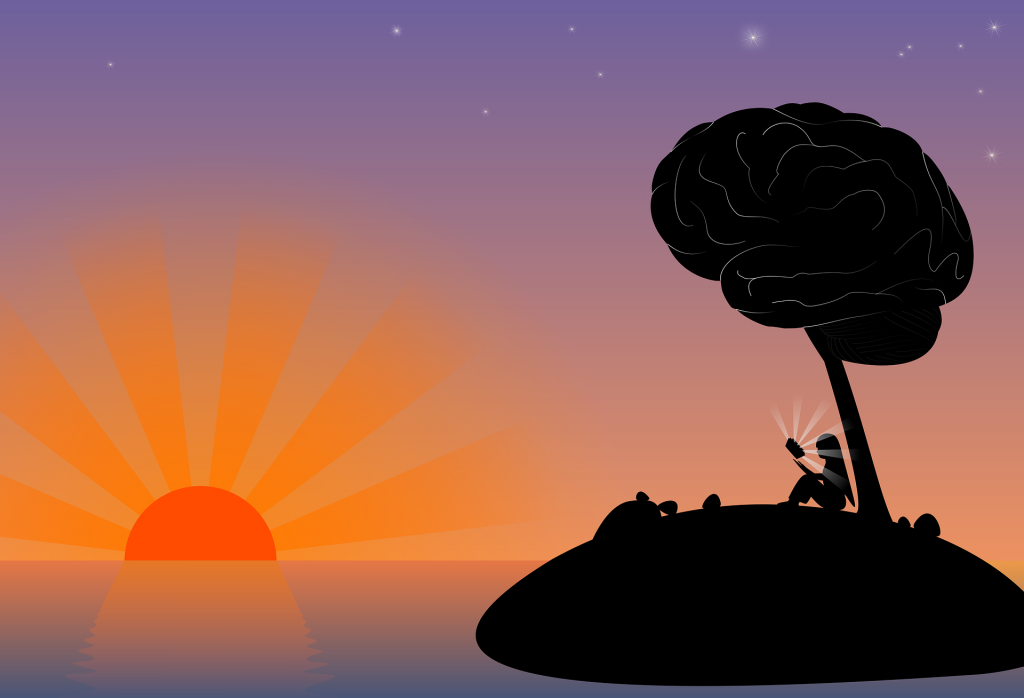We are all always looking for ways to lower our stress. So, here are three secrets that stress physiologists themselves use in order to get back to a calm confident state of mind. Let’s go!
Secret #1: Look up! No seriously…right now! If you’re staring at your computer, your tablet, your device…just look up and out and expand your peripheral view! In the modern world, so much of our attention is focused in this close range. Americans will spend more than 7 hours a day on average on their screens, tablets, phones, and computers. Certainly I could take this in another direction and talk about the dangers of screen time, but that’s not where I want to go with this. The big concern that I want to talk about today is the signal that we’re sending to our brain when we’re only looking at close range things. Our brains and our senses rely on one another for a reciprocal information exchange where both our senses are affecting our brain, and our brain is affecting our senses. When our brains are internally stressed, they send out a signal to narrow our vision that would have been really helpful if a tiger was charging at us back in the day. We don’t want to be distracted by those delicious looking berries over there. In the example of a tiger charging at us, that tunnel vision is really kind of important (good call brain!), but in the modern world, where we’re constantly narrowing our vision and focusing only on the thing directly in front of us, what we’re signaling to our brain is that our brain should be stressed. We can’t actually expand our periphery to look around us. We have to focus right in front of us, usually at our screens. Now wait a second…there’s not a tiger charging at us…it’s just an email. Meanwhile, our brain is saying “tigers, lions, bears – oh my gosh!!” Obviously, our eyes have spotted something that needs our full, undivided attention, and our brain just does its job by releasing hormones like adrenaline and cortisol to prepare our body to fight/freeze/flee…wait. It’s just a screen.
To break the misinformation campaign that’s being cycled in our brains from our sensory input to output, we just simply need to look up or expand our vision to the periphery. Go ahead and try this now! When we do this, we open the aperture of our eyes, relax them, and send a signal to our brain that says, “oh we’re safe here, it’s okay.” Have you ever noticed that when you’re on a mountain looking at a big view or sitting in front of the ocean, you get really relaxed? In part, that’s because your brain is being signaled by this large, peripheral vision that you have that you’re safe. We can do this anytime – even when we’re not on a mountaintop or sitting in front of the ocean – by expanding your vision. Whenever you’re feeling stressed, you’re turning off that attentional stress mechanism that gets triggered by the narrowing tunneled vision. Whenever you’re feeling stressed, expand your peripheral vision to signal to your brain you’re okay.
Secret #2: Distract yourself! Research has found that more than any other technique, by distracting yourself temporarily from the acute stressor that is causing the surge of stress, you can actually begin to lower your stress. Seriously! More than any other technique, distracting yourself from the stressor turns out to be one of the most effective ways to overcome it. Focus on something completely unrelated to the stressor itself. Maybe try counting all of the yellow or green things that you see in the environment around you, or do a long division problem in your head. When you engage consciously in these cognitively demanding tasks, what you’re signaling to your brain is that you’re not in a state of actual danger. If a tiger was chasing you again, you probably wouldn’t be doing long division in your head or looking around your environment. As a bonus, if you try the distraction technique where you’re actually counting yellow or green or any colored things in the environment, you’re likely expanding your peripheral vision and looking around you. This comes right back to the secret number one for lowering your cortisol!
Secret #3: The physiological sigh. Have you ever sobbed so hard that you start taking those short little inhales? Subconsciously, your body is trying to get you back into a state of relaxation. Here’s what’s happening: whenever you’re sobbing like that or you’re just stressed or a little bit anxious, you start taking inhales that are a little bit shorter and shallower, not giving the entire expansion of the lung a chance to balance out the gases between oxygen and carbon dioxide. When we become anxious or stressed, we begin taking these short shallow breaths, which disrupts the balance of gases in our system. In order to get back to a homeostatic state, our body does this weird breathing pattern naturally – at least when we’re sobbing. What you’re actually doing there is that second inhale is expanding the alveoli (those little air sacs in your lungs) which collapse when we’re stressed, trapping CO2 in there and getting this balance of gases completely thrown off. By taking that second short inhale after you’ve already begun the deeper inhale, you’re forcing those aviolic sacs open again, which means when you exhale, you’re pushing out all of the CO2 and getting back to a better balanced state.
The cool thing here is that you don’t just have to rely on your body to do that automatically while you’re sobbing. You can do a physiological sigh anytime you’re feeling stressed! We can help our bodies to recalibrate and offload a whole bunch of CO2 at once anytime simply by consciously engaging in a physiological side. Try it! Start by inhaling as deeply as you can through your nose, and when you don’t feel like you can take in any more oxygen, take one sharp inhale. At this point, those alveoli sacs have expanded, and now when you exhale you’re offloading all of that extra carbon dioxide. Research like that done at Dr. Andrew Huberman’s lab in Stanford suggests that just one or two of these physiological sighs throughout the day can rapidly offload stress from the body.
I hope you found this helpful in order to stress less. Continue to live more, and fear less!








